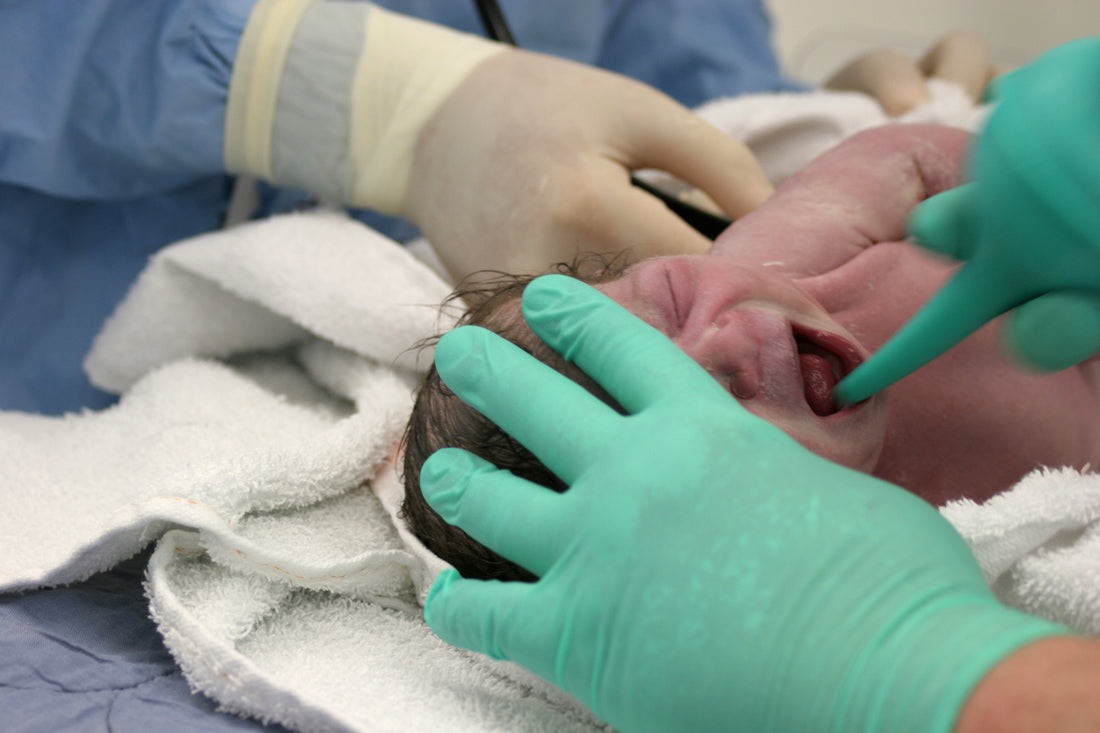Suctioning the Airway of a Baby at Birth May Be Harmful

Evidence based clinical guidelines recommend not suctioning a baby’s airways unless they are unresponsive, floppy and require resuscitation. And even then only to do so using a laryngoscope so that you can see what you are doing.
There is a natural ‘Fetal Heimlich Maneuver’ that occurs as the baby is born. He gets a nice tight squeeze right around his sternum (breastbone), by the intact perineum, which pushes amniotic fluid out of the esophagus and mouth in a way that is like a natural Heimlich maneuver.
It is normal for a baby to work fluid out through birth and as he transitions over to using his lungs to breathe. It used to be thought that suctioning should clear everything out so your baby can breathe better. But studies have shown that this suctioning can actually cause your baby to receive less oxygen than is optimal.
Suctioning at birth: Source
- Does not reduce the risk of MAS
- Can cause the baby to gasp (inhale deeply which is exactly what you are wanting to avoid with meconium stained liquor) (Roggensack et al. 2009)
- Can lower the baby’s heart rate for up to 20 minutes (vagal bradycardia) (Waltman 2004).
- Can interfere with the initiation of breastfeeding (Killion 2000)
- Can cause tissue trauma (Davies & MacDonald 2008).
- Can produce bradycardia
- Can cause laryngospasm
- Can cause cardiac dysrhythmias
- Can cause edema
- Can cause trauma to mucous membranes
- Can cause tachycardia
- Can cause emotional distress
- Can cause bronchospasm
- Can cause cardiac arrest
Suctioning can truly hurt the baby, physically and emotionally. It can also damage the breastfeeding relationship. When a new baby is transitioning from one way of living and breathing to a very new way, where he has to keep warm, and eat to feel full, and breathe, and manage the new brightness of the world - being poked in the nose and mouth and throat is a very unnecessary act to add to the mix, especially when it is not actually doing anything beneficial.
Some newborns take longer to transition than others. Hearing the gurgling sound of a brand new baby can be scary. (Even for doctors who have heard it numerous times before.) It is very easy to reach for the bulb syringe to try to suction out the fluid in an attempt to help the newborn transition faster. But this is not evidence-based birthing.
Latest Research
The latest research shows that babies who have their faces wiped after birth have a clinical outcome that is exactly the same as those who are suctioned, but without the damaging risks.
What about suctioning when there is meconium?
Meconium is the sticky black bowel movement that your baby will pass in his first days after he is born. Sometimes babies pass it in utero during labor, or sometimes as they are being born. This is a completely normal process. Many doctors routinely suction the baby's mouth and nose only when there is meconium stained amniotic fluid present.
A baby aspirating (breathing in) meconium can cause Meconium Aspiration Syndrome (MAS). Suctioning the baby's mouth and nose to reduce the amount of meconium has been believed to help prevent this; however, current research shows there is no difference in outcomes between babies suctioned and those left alone. Look at the research and make a decision with your birth team for what you would like if the case presents itself.
Additional Resources:
http://midwifemelissamarks.com/evidence-based-midwifery-the-case-against-newborn-suctioning/ https://neonatalresearch.org/2013/06/17/we-can-stop-routine-suctioning-at-birth/ http://www2.aap.org/nrp/docs/iu/2013_fallwinter_iu.pdf http://www.ncbi.nlm.nih.gov/pmc/articles/PMC3830145/
NICE guideline, Resuscitation Council UK, more guidelines (Geneva Foundation for Medical Education and Research).








